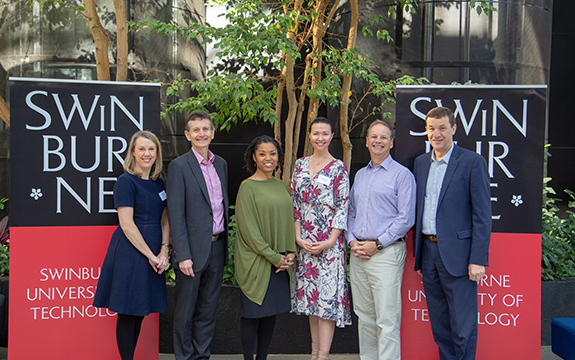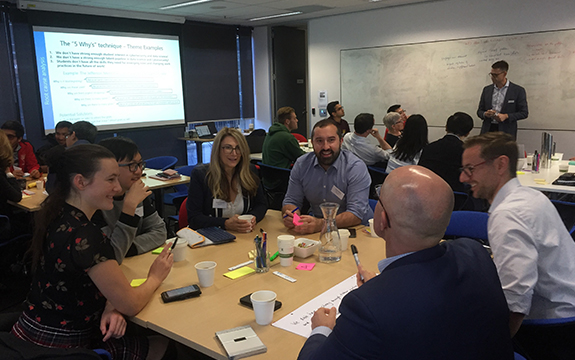Swinburne and Microsoft employability pilot

In Summary
- Microsoft trials employability skills program pilot at Swinburne
- The program involves a select group of universities globally
- Industry, staff and student workshop focussed on digital skills and the future of work
Swinburne has joined with Microsoft in a partnership to pilot an employability skills program to empower its students and foster job-ready, employable talent in high-demand technical roles.
Swinburne is part of a select group of universities globally involved in Microsoft’s program.
Through participation in the pilot, Swinburne is contributing to the development of Microsoft’s online employability platform that enables students to discover potential skills and career paths that match their interests and aptitude, as well as supporting them in acquiring 21st century skills to help in their journey towards sustained employability.
As part of the employability pilot, Microsoft trialled a series of workshops at Swinburne in April 2019 to help students enhance their employability prospects.
“Swinburne students were invited to participate in Microsoft’s exciting pilot workshops. It was a truly unique opportunity for students to gain valuable new insights that will help their employability journey and to also provide feedback about the value of the workshops, helping to shape them for the future,” says Professor Duncan Bentley, Swinburne Deputy Vice-Chancellor (Academic).
“The speed of technology and industry change is impacting how people learn and how they get jobs. Swinburne cares about its students’ learning, and their ability to get a job after graduation and fulfil their professional purpose. It is essential that students understand the techniques of getting a job and how to demonstrate their skills and capabilities to prospective employers,” says Professor Bentley.
The student-focused workshops included the use of personal social networks and professional e-portfolios in securing 21st century jobs, along with the use of LinkedIn to establish a professional brand to showcase skills, talents and experience.
The headline event covered digital skills and the future of work, with a focus on the emerging skills gap in tech roles such as cybersecurity and data science. Representatives from the tech industry, Swinburne students and staff, and a team from Microsoft and LinkedIn worked together in an interactive co-creation session to discuss ways to address the skills shortage and create a stronger tech talent pipeline in our region.

“By fostering industry connections, working with industry and embedding industry experience in students’ study, Swinburne is uniquely placed to contribute to workforce transformation and ensure that students are employable and ready to pursue their professional purpose,” says Professor Bentley.
Director of Microsoft 21st Century Jobs, Skills and Employability, Romanita Hairston-Overstreet, shared details of the current technical skills shortage. Employability is a key issue globally with 808 million individuals needing to learn new skills for their jobs by 2020, 50 million people needing to fill open technical jobs by 2030, 40 per cent of employers reporting that skills shortages have a negative impact on their business and 65 per cent of students today likely to do jobs that don’t yet exist.
In a keynote address, Higher Education Industry Director for Microsoft Australia, Ray Fleming, highlighted the major shift in employment and the blurring of the physical and digital divide in the fourth industrial revolution. With changes in the economy and growth of jobs in technology, workers need tech skills alongside complex problem solving, critical thinking, creativity and people skills to ensure optimum outcomes.
The industry attendees at the workshop included leaders from the Australian Bureau of Statistics, Elbit Systems, Ericsson Australia, Redgum Technologies and Softel Systems.
Mixed teams of industry professionals, students and academics participated in an ‘ideathon’ around themes of student interest, talent pipeline and skills building in cybersecurity and data science to identify issues, discuss potential solutions and pitch ideas. Key themes identified in the pitches addressed the lack of general awareness about the nature of cybersecurity and data science roles in industry and the need to foster interest in technical skills in school curricula.
Solutions from the ideathon included creating a stronger talent pipeline in data science and cybersecurity by connecting students with employers locally through internships and short term projects, while ensuring they also track their attainment of skills.
The lack of gender equity in the field and the need for diversity was acknowledged as a key issue.
Solutions to promote more awareness of cybersecurity and data science included gamification of opportunities, competitions in schools, awareness sessions and industry coaches, all delivered through partnerships between government, industry and education institutions.
Swinburne looks forward to continuing to work with Microsoft on the further development of employability programs that will build future-ready graduates and secure the talent pipeline for new 21st century roles critical for the economic and social future of Australia.

